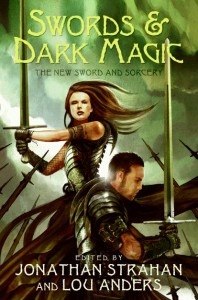The Singing Spear by James Enge: One of the shortest stories in the book. It’s about a man calles Morlock Ambrosius. Really? Oh, well… Morlock is a maker of things and since he invented a still that could destill wine and gave it to a tavern owner, he is getting free alcohol and is permanently drunk. His hazy life gets disrupted when news come to him that someone recovered the Singing Spear, a magic spear he created a long time ago, which unfortunately is cursed. Now a madman is roaming the cuntry slaughtering everyone and everything he comes across, but Morlock doesn’t care. Not his problem. Until the tavernkeeper joins the refugees who are fleeing the country, which means no more free booze for Morlock! So he got to do something.
This is another really bad story. It’s short, nothing happens, and it overall feels like a draft written in two hours and phoned in. You don’t submit such a thing for publication. The common complaints apply here as well: The actual story really begins only in the last third and the author wasted not a single sentence on describing anything.
Continue reading “Book Review: Swords & Dark Magic (Part 2)”

